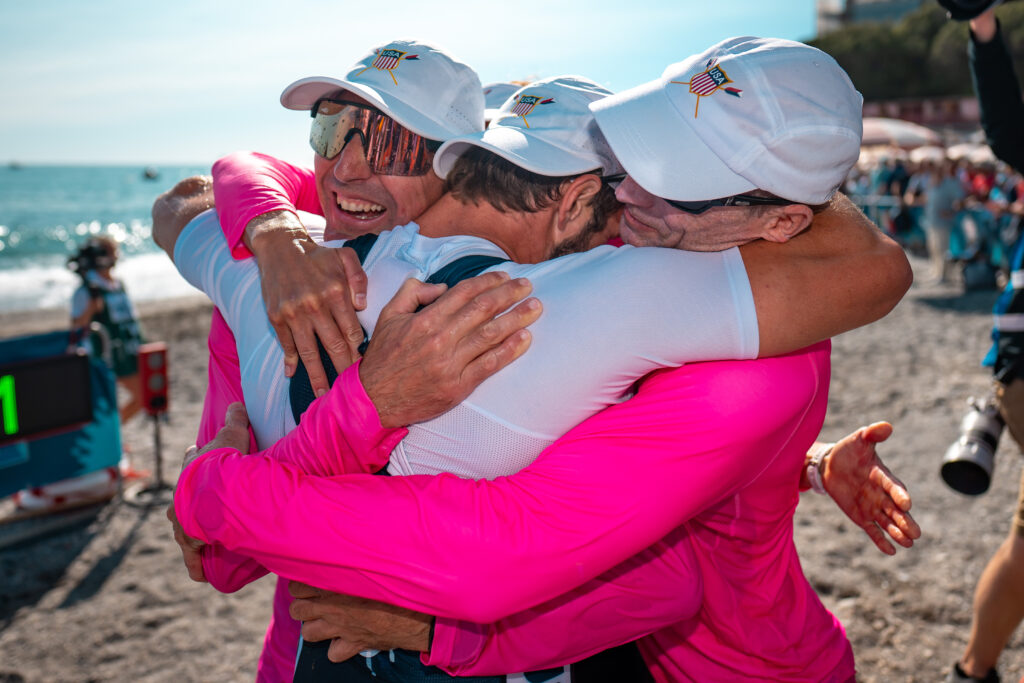
04 Oct 2024
Training the Beach Sprint Athlete with Marc Oria
With the Los Angeles 2028 Olympic Games officially confirming Beach Sprint Rowing in their programme, alongside Classic Rowing, this is a good opportunity to explore this exciting and growing Coastal Rowing category more closely. Marc Oria, who coaches the US Coastal Rowing Team and runs the coastal rowing programme ‘Next Level Rowing’ , shares his insights on what is the best training programme for Beach Sprint athletes.

Reflect for a moment. Less than a decade in existence compared to flat-water rowing which can date back to regattas over 800 years ago. That is partly what makes Beach Sprints so appealing. It’s on a huge learning curve for athletes and coaches alike as they invent, experiment and develop the best way to go fast.
One of the few specialist beach sprint coaches in the world is Marc Oria. Based in Cincinnati, Ohio, United States, he lives quite far from a coast, but he does not see the distance to a Beach as an issue, and the results of his athletes back that up.
Oria’s philosophy is to coach athletes, not rowers. “I try to create more athletic rowers that are not just thinking about rowing. My philosophy is to build an athlete that can cover the requirements of beach sprints. They have to run, jump, row, feel the ocean, work with the ocean. Adapt. It’s not just rowing. It’s training to try and work all of those skills.”
Originally from Barcelona, Oria started rowing as a teenager doing both flat water and coastal rowing. For Oria coastal was used as a break between the flat water season.
Coastal in Oria’s region was well developed. “We had France to compete against. We had the classic Marseilles-Cassis race. We used coastal for off-season training.”
Oria made the Spanish (flat water) rowing team and competed for Spain before his PhD studies took over. As a scientist Oria continued to row. Then as a post doc fellow in London he found himself too far away from a rowing club. Triathlon and ultra running took over. This variety in his sporting background helped him when he began coaching.
Now in Cincinnati, Oria is working and coaching at the University of Cincinnati. He coaches both flat water and coastal beach sprint rowing with athletes also at the Miami Rowing Centre and Cincinnati Rowing Club.
Rowing is at the heart of Oria’s beach sprint preparation. But he focuses on making good athletes so there’s training in being agile, getting in and out of the boat and, most importantly due to the short duration of the race, “doing less mistakes, making less errors.”
No two races are the same in beach sprints. Even a race on the same day can present very different conditions. Making less errors means being prepared for anything. Oria cites the 2024 World Rowing Beach Sprint Finals held recently in Italy.
“The exit (from the boat at the finish) was difficult. It was a dumping wave so we saw a lot of the athletes missing a good exit.”
This bring Oria to the concept of adapting. As a coach, he says he is good at being creative. “Every event will give us a new idea of what we need to work on. Every athlete has something to improve. Each athlete has their own strength and weakness. That’s why it’s so exciting. I try to be realistic. Each athlete is different. One athlete prefers one way. Another, another way. I need to be creative.”
In terms of the type of athlete that most suits beach sprint racing, Oria says it’s still evolving.
“The athletes that adapt are the ones that are doing better.” They come mainly from flat water rowing but, says Oria, over time the ones that will win will be the ones focusing on beach sprints. “At the moment we see the bigger athlete doing well, but sometimes it’s the lighter athlete.” Oria notes that the conditions on the day play a part.
Oria reiterates the main takeaway. “It’s a really young sport so we’re all scratching our heads as coaches and we’re all trying something different, something better. Someone will turn up at an event and they’ll be trying something new. Just because I have medals doesn’t mean I don’t have to try and improve.”
Oria predicts that with the inclusion of beach sprints at the LA 2028 Olympic Games, as we get closer to the Olympics the finish time gaps will get smaller and smaller. Races will be won or lost by just 0.1 of a second. “It’s getting more popular.”
Oria sees national teams investing more and attracting more quality athletes. “The times are getting faster and the finishing times are getting closer.”

